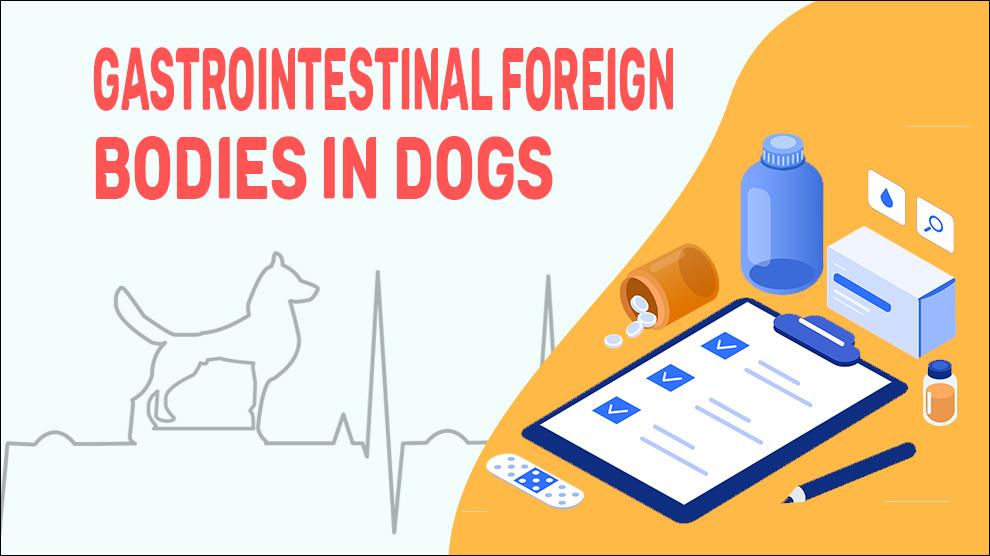Gastrointestinal foreign bodies (FB) or stomach/bowel obstruction are among the most common causes of emergency veterinary surgery. When a pet eats a non-food foreign object and it cannot pass through the gastrointestinal (GI) tract. Small foreign bodies (linear) often result in partial obstruction, while round, large objects often cause complete obstruction.
Foreign bodies can be non-digestible objects (toys, socks, pantyhose, string) or slowly digested foods (bones). These items can become lodged inside the stomach, intestinal tract, esophagus, or under the tongue. Sometimes, foreign bodies can get lodged or stuck in several locations in the GI tract if they are composed of linear FBs such as fabric, carpet, or strings.
The digestive tract includes the oral cavity, passing food from the mouth, down the wedge-shaped muscular tube esophagus, into the thick-walled, muscular organ stomach, through the small intestine (small intestine occupies roughly 25% of the total GI volume) then resulting in the formation of stool in the colon and expelled through the rectum.
The ingesta (swallowed things) usually take 6-20 hours to move through the entire digestive tract whereas in humans it’s between 20-30 hours. The larger objects usually block the small intestine or obstruct stomach outflow. Due to the incessant movement of the intestinal tract, the linear foreign bodies can literally clog the intestines into an accordion-like mass. Some non-digestible objects can actually stay in the stomach for a longer duration, even for months.
Symptoms Of Gastrointestinal Foreign Bodies
- Chronic vomiting
- Chronic diarrhea
- Dehydration
- Hyporexia to anorexia
- Abdominal pain
- Subcutaneous edema
- Pleural effusion
- Ascites
Treatment Options For Gastrointestinal Foreign Bodies
Endoscopy: Most of the foreign objects in the stomach can be removable with an endoscope. A long fiber-optic tube is inserted through the mouth, potentially allowing the vet to grasp the object and pulled through the grabbing instrument in the endoscope.
If the foreign material is lodged in the intestine, Endoscopy cannot be an appropriate treatment choice and only abdominal surgery can get rid of it. A small surgical opening is made in the stomach or intestine and the foreign material, as well as a damaged section of the GI tract, is removed.
Antibiotics: Metronidazole, Tylosin, or Oxytetracycline
Anti-inflammatory: Prednisolone or Prednisone, Cyclosporine, Chlorambucil, Budesonide, or Sulfasalazine
Home Remedies For Gastrointestinal Foreign Bodies
When you believe that your pet has swallowed a foreign object, contact the vet immediately.
There are no proper home remedies available to remove foreign objects for the GI tract.
Prevention Of Gastrointestinal Foreign Bodies
- Dogs only have a toddler’s level of intelligence. Some dogs have a stronger penchant to consume foreign objects.
- Check your dog’s eating habits.
- Keep little objects that could be swallowed out of their reach.
- Try to find suitably sized chew toys with respect to all pets in your home.
- Inspect all stuffed animals and chew toys you offer your dogs that may be eaten or chewed off.
- Dispose of any smaller remnants. Never leave ribbons or strings within reach of your dogs.
Affected Breeds Of Gastrointestinal Foreign Bodies
There is no breed restriction.
Border Collie, Springer Spaniel, Jack Russell Terrier, and Staffordshire Bull Terrier
Additional Facts For Gastrointestinal Foreign Bodies
1. Causes:
The most common causes of obstruction are
- Bones
- Pet toys
- Paper, sticks, wicker
- Food wrapper, tissues
- String, yarn, and other craft supplies
2. Mortality:
A dog with complete gastrointestinal blockage or stomach obstruction could die within 3 - 5 days when rapid medical intervention is not provided.
3. Diagnosis:
- Abdominal radiograph
- Computerized tomography
- Gastrointestinal transit studies
- Barium small bowel series
- Gut biopsies: include mucosal biopsies of the stomach, duodenum, and/or ileal mucosa (ileostomy)
- Antroduodenal manometry
4. Prognosis:
In most cases, gastrointestinal foreign bodies are a temporary condition and it is manageable with appropriate treatment. Complete recovery is possible and it is typically able to continue with daily activities.
When To See A Vet
Contact your vet right away, if you notice any of the following:
- Chronic vomiting
- Chronic diarrhea
- Abdominal pain
Food Suggestions For Gastrointestinal Foreign Bodies
What to feed?
- An allergen-free (hypoallergenic) balanced diet ( check for thickeners, coatings, flavors).
- Consider a diet with all essential nutrients and also provides plenty of antioxidants (combat free radicals).
- Consider a probiotic supplement.
- Lean boiled meats.
- Chicken baby food.
- Cottage cheese and yogurt.
- Fiber-rich foods:Apples, pears, oatmeal, and other foods.
Conclusion
The best way to avoid ingestion of gastric foreign bodies is to control access to swallowable objects. Permit your dog to only chew on toys that are non- swallowable.
The earlier your dog receives medical intervention, the better the dog’s chances of full recovery with lesser or no complications.

















